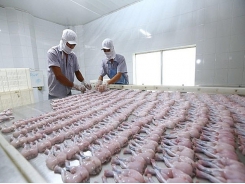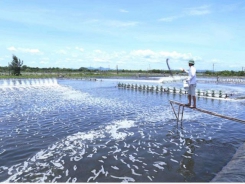High-tech shrimp breeding yields high profits

BÀ RỊA-VŨNG TÀU — More farmers, co-operatives and companies in the southern province of Bà Rịa-Vũng Tàu are seeing much higher profits by using advanced farming techniques to breed shrimp.
Breeding shrimp with advanced farming techniques in Bà Rịa-Vũng Tàu Province’s Vũng Tàu City. — VNA/VNS Photo Hoàng Nhị
Under high-tech farming models which use super-intensive farming, the beds of shrimp breeding ponds are covered with plastic sheets and anti-sunlight nets are hung above. The models are also equipped with oxygen-generating facilities.
Besides shrimp breeding ponds, other ponds filter water which is released into shrimp breeding ponds or used for treatment of waste water.
High-tech shrimp farming has a success rate of 90 per cent and offers far higher profit than traditional shrimp breeding in mud ponds, according to farmers.
Bùi Thế Vương began using advanced farming techniques to breed shrimp on a 7ha farming area in Long Điền District’s An Ngãi Commune last year.
In the 7ha area, he uses 1.5ha for shrimp breeding ponds and the rest for ponds to filter water and to treat waste water.
High-tech shrimp farming can produce three shrimp crops a year, up nearly two times against traditional farming models, Vương said.
The death rate of shrimp bred in high-tech shrimp farming is significantly lower compared to traditional farming models.
He has bred five shrimp crops under the model and earns about VNĐ1.2-1.4 billion (US$51,000-60,400) each crop.
In Vũng Tàu City’s Ward 12, 20 salt farmers have switched to breed shrimp because of low salt prices and unfavourable weather, and eight of them are applying high-tech shrimp farming, according to the Ward 12 Fishery, Agriculture and Salt Production Division.
Lê Quang Hùng, one of the salt farmers in Ward 12, switched from salt monoculture to rotating black-tiger shrimp breeding and making salt in 2005, and then later switched completely to breeding shrimp.
In 2018, Hùng invested VNĐ1 billion ($43,000) in high-tech shrimp farming for his 1.5ha. He built two ponds for breeding shrimp and three ponds for treating water, and bought oxygen-generating facilities, plastic sheets and anti-sunlight nets for shrimp ponds.
He now breeds three shrimp crops a year with an output of more than 16 tonnes of shrimp a year.
“I earn a profit of nearly VNĐ1 billion a year," he said.
Last year, the Quyết Thắng Agriculture Co-operative in Bà Rịa City’s Long Hương Ward used a recirculating aquaculture system and poly-greenhouse to breed shrimp on 2,000sq.m.
The high-tech farming helps manage the quality of water used to breed shrimp, reduces the shrimp death rate and disease risks caused by weather, and protects the environment as the waste water is treated thoroughly.
The model offers a yield of 15 tonnes per 2,000sq.m per crop, according to the co-operative.
The province has about 352ha of shrimp bred under high-tech shrimp farming, up nearly 100ha against a year ago, according to the province’s Fisheries Sub-department.
Under high-tech shrimp farming, shrimp can be bred at a density of 250-500 shrimps per sq.m. Water used for breeding shrimp is closely managed and is not affected by weather conditions, so shrimp can be bred year round.
Nguyễn Hữu Thi, head of the sub-department’s Aquaculture Management Division, said the high-tech shrimp farming models in the province have had positive results and helped shrimp breeders cope with climate change.
“High-tech shrimp farming has also improved production efficiency since shrimp are bred at a high density,” he said.
To encourage more farmers to apply high-tech farming, the division is organising courses on advanced farming techniques to help farmers make the switch from traditional shrimp farming.
Related news
Tools

Phối trộn thức ăn chăn nuôi

Pha dung dịch thủy canh

Định mức cho tôm ăn

Phối trộn phân bón NPK

Xác định tỷ lệ tôm sống

Chuyển đổi đơn vị phân bón

Xác định công suất sục khí

Chuyển đổi đơn vị tôm

Tính diện tích nhà kính

Tính thể tích ao



 Vietnam’s agriculture regulator warns about new virus on…
Vietnam’s agriculture regulator warns about new virus on…  Việt Nam shrimp exports to surge as demand…
Việt Nam shrimp exports to surge as demand…